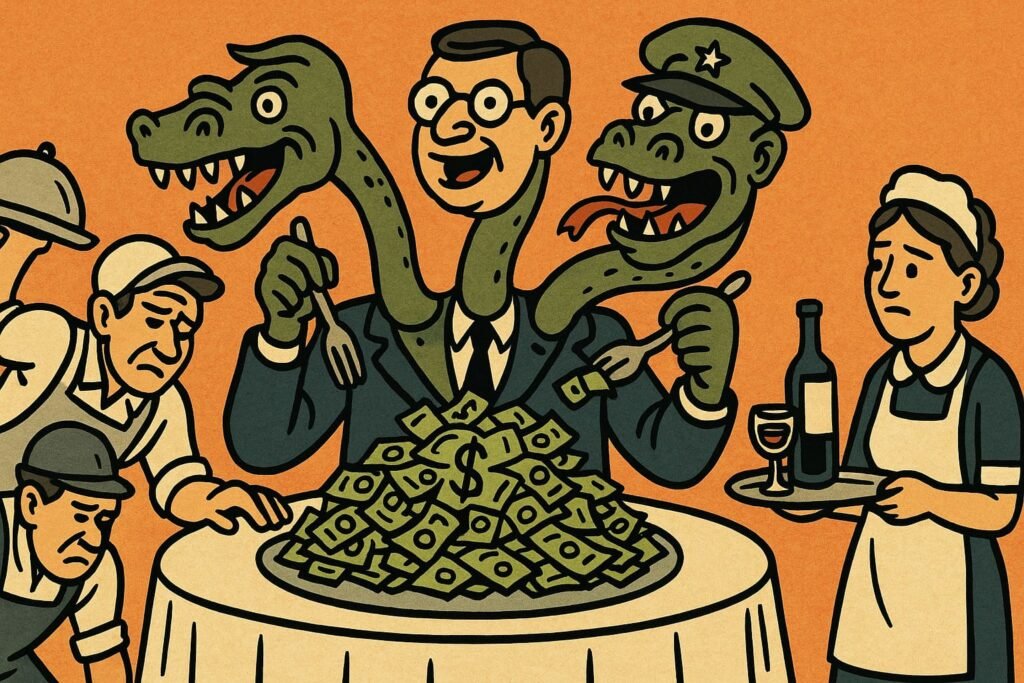Managerial Capitalism Explained – When Managers Replace Owners
Capitalism used to be simple: capitalists owned the factory, workers did the labour, and profits flowed to the owner.
Unfair, yes, but at least you knew who was in charge.
Today, that’s changed. The capitalists aren’t running the show anymore. Managers are. Bureaucrats, CEOs, generals — the “managerial class” — have taken over, and they’re not taking risks. They’re taking rewards.
Table of contents
What Is Managerial Capitalism?
Managerial capitalism is when ownership takes a back seat and managers take control. They don’t own the companies or nations they run — but they extract the profits, control the systems, and write the rules anyway.
- Corporations: unelected, but permanent.
- CEOs: come and go, but managerial power always flows.
- Stakeholder capitalism: accountability to “everyone,” which in practice means accountability to no one.
Meet the Managerial Class
Think of it as a three-headed hydra:
- Public Managers – Bureaucrats, technocrats, and civil servants who run departments nobody voted for. Regulations, permits, endless paperwork — they wield power without elections.
- Private Managers – CEOs, CFOs, HR directors. They rake in bonuses, golden parachutes, and perks while outsourcing risk and cost to workers.
- Military Managers – Generals, defence contractors, and security consultants. They cycle between battlefield and boardroom, feeding the war industry.
The borders blur: generals become consultants, civil servants join multinationals, corporate bosses sit on government panels. It’s one big revolving door — and it always revolves in their favour.
How It Works in Practice
They Don’t Produce — They Manage
No farms, no factories, no building. Just meetings, strategies, and reports. Layers of “oversight” that add cost but no value.
Outsourcing Production
Factories moved abroad for cheap labour. The savings? Not for workers or customers. They’re funnelled into executive bonuses and “transformation projects.”
Tax Games
Accountants design offshore schemes so profits vanish. Hospitals, schools, and roads go underfunded while workers pick up the bill.
Bought Politics
Lobbyists — often ex-politicians — write laws that protect managers. Outsourcing, union-busting, golden parachutes: all legalised by design.
Managerial capitalism isn’t a bug in the system. It is the system.
The Cost – Paid by You
Managerial capitalism looks abstract until you feel it:
- Higher prices for worse services.
- Stagnant wages while executive pay soars.
- Public services collapsing under bureaucracy.
- Everyday life getting more expensive while managers “optimise.”
You work harder, they manage more.
You pay more, they collect bonuses.
Why It Matters
Managerial capitalism flips the old story:
- Risk → pushed down to workers and taxpayers.
- Rewards → hoarded by managers.
- Democracy → reduced to theatre while the managerial class runs the machinery.
They don’t own the system, but they own the outcomes.
It’s not entrepreneurship. It’s a protection racket with a tie and a PowerPoint.
👉 For the bigger picture of how corporations gained their power, visit The Power of Business & Corporations Explainer Hub.
FAQ
What is managerial capitalism in plain English?
It’s when managers — not owners — run the system, extracting profit and power without risk.
Who are the “managers”?
Bureaucrats, CEOs, HR heads, generals — the whole class that controls without owning.
How is this different from traditional capitalism?
Old capitalism: owners risked capital, workers laboured.
Managerial capitalism: managers risk nothing, but profit anyway.
Why is stakeholder capitalism linked to this?
Because it sounds noble (“accountable to everyone”) but means accountable to no one. It’s a smokescreen for managerial power.
Why is it dangerous?
Because it creates an unaccountable elite — unelected, entrenched, and very expensive for everyone else.



